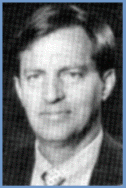
 |
James Towery |
After a long, rigorous campaign, Towery savors bar's victory, which he calls a solid vote in support of an independent profession
Each month, President James Towery answers questions from members in this column. Please address your questions to: Ask the President, California Bar Journal, 555 Franklin St., San Francisco 94102-4498.
This month's question and Towery's response:
QUESTION: Now that California lawyers have voted by a margin of almost 2-1 to keep the unified bar, what is next for the State Bar? What is your interpretation of the plebis-cite results, and will the legislature move anyway to abolish the State Bar?
TOWERY: First, I am extremely gratified by the results of the SB 60 plebiscite. It was a long and rigorous campaign, a true team effort to defeat this attempt to abolish the State Bar.
We built a remarkable coalition of volunteers and local, minority and specialty bars to campaign against the plebiscite. I am deeply appreciative of the efforts of the Coalition to Save the Unified Bar (CSUB) and all its volunteers who worked so hard for its defeat.
It is a victory to be savored.
The meaning
What do the plebiscite results mean? I believe there are several answers to that question.
First, it is clear that a strong majority of California lawyers want to maintain the independence of the unified bar as an arm of the Supreme Court. The majority of lawyers were greatly concerned about the potential for legislative interference with the independence of the bar.
I think the plebiscite results are a signal that lawyers believe the structure of a unified bar is best suited to maintain a strong and independent lawyer discipline system and high ethical standards for our profession.
I believe that lawyers responded positively to CSUB's arguments that the present bar serves many other useful purposes, ranging from fostering legal services for the poor to the work of the State Bar sections and committees.
I also believe that the significant minority of lawyers who voted "yes" as well as the many lawyers who voted "no" with reservations are sending a potent message to the State Bar, a message we have surely heard.
That message reveals a substantial desire to see the bar change its ways. While the messages of dissatisfaction have been quite diverse, there are several themes which have clearly emerged from the plebiscite debate.
The debate themes
First, many lawyers view the State Bar as too bureaucratic and inefficient and do not believe their dues dollars are well spent. Second, many lawyers believe that the State Bar is out of touch with the daily reality of their practice and that the bar is not sufficiently responsive to the needs of lawyers.
As I have said repeatedly, the bar has heard the voices of discontent and is moving to address those issues.
For two years the bar has been engaged in serious cost-cutting, and we have cut $4 million from the bar's budget. It is this cost-cutting which allows the bar to go forward with a $20 dues reduction for 1997.
It is our goal to sustain that reduced level in the future. The senior management of the bar, the Board of Governors, President-elect Tom Stolpman and I all are dedicated to continuing to search for ways to perform its mission more efficiently.
Responsiveness
The bar also is moving in many directions to become more responsive to its members. The bar has engaged in outreach this year -- to public lawyers, minority lawyers, solo and small firms and local bars, among others -- to an unprecedented extent.
In addition, the staff of the bar is focusing on customer service. We have tried to listen to the feedback we receive and respond to that feedback.
This also will be one of Tom Stolpman's focal points during the coming year. And we have clearly learned that the bar must improve communication in order to inform members and the public about its function.
As for future action in the legislature, I am hopeful that legislators will respond positively to the collective voice of the legal profession as expressed in the plebiscite vote and put to rest any plans to dismantle the independent bar.
While it is true the plebiscite vote is only advisory, the expressions we have heard thus far from Sacramento are to the effect that the legislature wanted first and foremost to learn whether the lawyers themselves wanted to maintain the unified bar. The lawyers have now spoken.
I do expect that the bar will continue to receive close scrutiny in Sacramento. I think the foremost legislative challenge the bar will face next year will be the issue of the appropriate dues level.
We must be cautious as we approach the dues debate. While we seek economy at the bar, we do not want to weaken our core functions.
A positive process
On the whole, the plebiscite has been a very positive process for the bar.
It has forced the bar to define its mission, listen to and respond to voices of discontent, focus on economics and customer service and reach out to the various constituencies of the bar.
The process did not begin with the plebiscite. We owe credit to past presidents Margaret Morrow, Don Fischbach and others who started the bar on this path.
The process of reform has been greatly accelerated this year by the plebiscite. And the reform process, now an integral part of the bar, will certainly not end with the plebiscite.
![]()